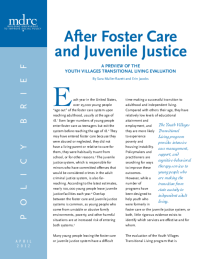After Foster Care and Juvenile Justice
A Preview of the Youth Villages Transitional Living Evaluation
Each year in the United States, over 25,000 young people "age out" of the foster care system upon reaching adulthood, usually at the age of 18. Even larger numbers of young people enter foster care as teenagers but exit the system before reaching the age of 18. They may have entered foster care because they were abused or neglected, they did not have a living parent or relative to care for them, they were habitually truant from school, or for other reasons. The juvenile justice system, which is responsible for minors who have committed offenses that would be considered crimes in the adult criminal justice system, is also far-reaching. According to the latest estimates, nearly 100,000 young people leave juvenile justice facilities each year. Overlap between the foster care and juvenile justice systems is common, as young people who come from unstable or abusive family environments, poverty, and other harmful situations are at increased risk of entering both systems.
Many young people leaving the foster care or juvenile justice system have a difficult time making a successful transition to adulthood and independent living. Compared with others their age, they have relatively low levels of educational attainment and employment, and they are more likely to experience poverty and housing instability. Policymakers and practitioners are searching for ways to improve these outcomes. However, while a number of programs have been designed to help youth who were formerly in foster care or the juvenile justice system, or both, little rigorous evidence exists to identify which services are effective and for whom.
The evaluation of the Youth Villages Transitional Living program that is described in this brief is designed to help fill this knowledge gap. Youth Villages, a nonprofit service organization for troubled children and their families, operates the Transitional Living program in seven states, including Tennessee, where the evaluation is taking place. The program, perhaps one of the most promising models to serve these youth now operating at scale, provides intensive case management, support, and cognitive-behavioral therapy services to young people who are making the transition from state custody to independent adult living. The evaluation will examine the difference that the Transitional Living program makes for this population — or its impacts on a range of outcomes, including education, employment, mental health, and financial security. It is intended to provide reliable evidence to inform the design of policies and programs for these populations at the federal, state, and local levels.
This policy brief provides an overview of the Youth Villages Transitional Living Evaluation, one of the largest and most rigorous evaluations of services for youth who are leaving the foster care and juvenile justice systems. It summarizes the policy context for the evaluation, describes the characteristics of the early study sample, offers preliminary observations from the beginning of the study, and lays out a timeline for the next steps in the evaluation.






